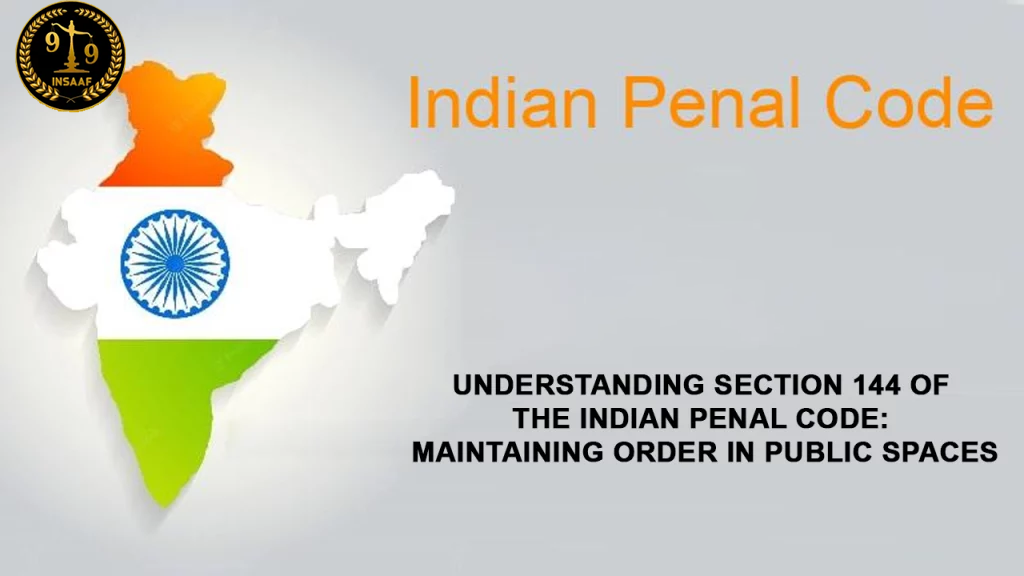

Online Legal Advice from Insaaf99® Online Lawyer Consultation in India


Online Legal Advice from Insaaf99® Online Lawyer Consultation in India

Section 144 of the Indian Penal Code (IPC) emerges as a pivotal legal provision aimed at preserving public order, especially in times of potential unrest or emergency situations. This statute grants authorities the authority to impose restrictions on the assembly of individuals, thereby safeguarding the safety and well-being of the general public. In this article, we explore the nuances of Section - 144, delving into its implications and the circumstances that warrant its invocation. Let's unravel the layers of this legal provision to comprehend its significance in maintaining societal harmony and public security.
Section 144 derives its authority from Article 240 of the Indian Constitution, which enables states to enact laws for the maintenance of public order. This constitutional provision empowers Executive Magistrates to issue temporary orders under Section - 144 in situations where:
This can encompass various situations, ranging from disturbances caused by loud music during night hours to unhygienic waste disposal practices affecting public well-being.
This broader category includes scenarios such as potential riots, strikes that pose a threat to essential services, or religious processions that have the potential to ignite tensions within the community.
By virtue of Article 240 and the subsequent enactment of Section 144, Executive Magistrates are vested with the authority to take prompt and preventive measures, imposing restrictions when necessary to maintain public order and ensure the safety of the populace. Understanding the constitutional underpinning of Section 144 sheds light on its role as a tool for proactive governance in times of potential unrest or threats to public peace
Also Read: - Efficient and affordable: now draft and send legal notices online or reply to legal notice online through insaaf99
Understanding these key aspects provides clarity on the targeted nature of Section 144 orders, the specific restrictions they can impose, their temporary nature, and the mechanisms in place for justifying and reviewing such orders, fostering a balance between public order and individual rights.

Section 144 serves as a crucial proactive tool in preventing situations that could escalate into chaos. Its applications include:
Limitations and Concerns: Despite its utility, Section - 144 raises certain limitations and concerns:
While Section 144 proves valuable in maintaining public order, its implementation requires a delicate balance to prevent misuse, mitigate economic impacts, and ensure the public is well-informed about the reasons and implications of the imposed restrictions.
Insaaf99, an innovative online legal consultation platform, proves invaluable in cases related to Section 144 of the Indian Penal Code. Leveraging advanced technology, Insaaf99 connects individuals with experienced legal professionals swiftly. For those facing legal complexities arising from Section 144, the platform facilitates timely advice, clarifying nuances and guiding individuals through the legal landscape. With easy accessibility and a user-friendly interface, Insaaf99 ensures that individuals can seek prompt legal advice, enabling them to navigate Section 144 issues efficiently and make informed decisions in the face of legal challenges.
Also Read: - Is online gambling legal in India - rules and regulation
In conclusion, Section 144 stands as a pivotal measure in preserving public order and averting potential threats. However, its effective application necessitates a nuanced approach that carefully navigates the fine line between upholding peace and safeguarding individual rights. Transparency in communication, proportionality in implementing restrictions, and a commitment to due process are paramount. Authorities must ensure that the use of Section 144 is justified by clear and reasonable grounds, preventing any undue infringement on fundamental liberties. By embracing these principles, authorities can harness the power of Section 144 as an essential instrument for maintaining public order while minimizing its potential drawbacks and upholding the delicate balance between collective peace and individual freedoms